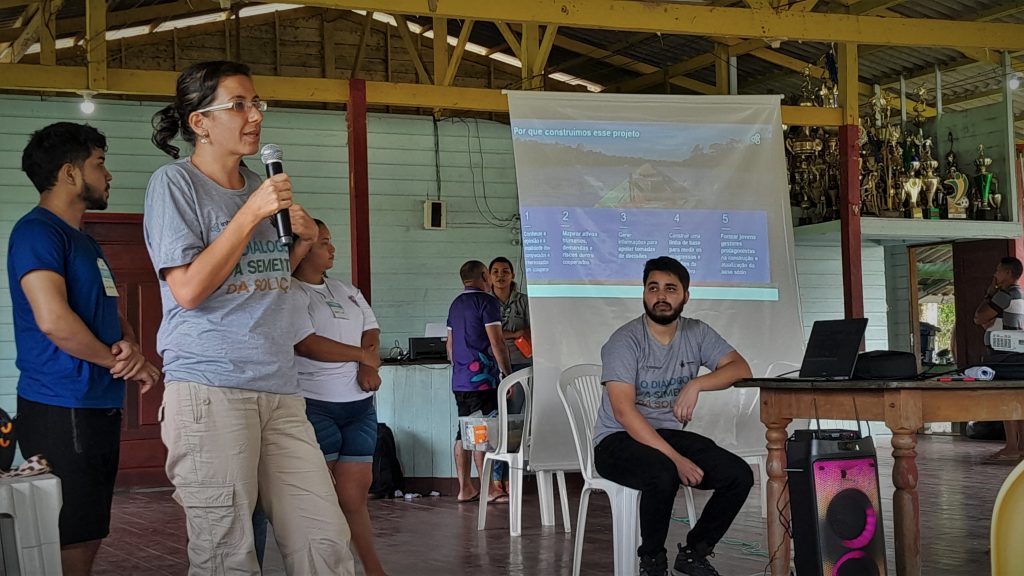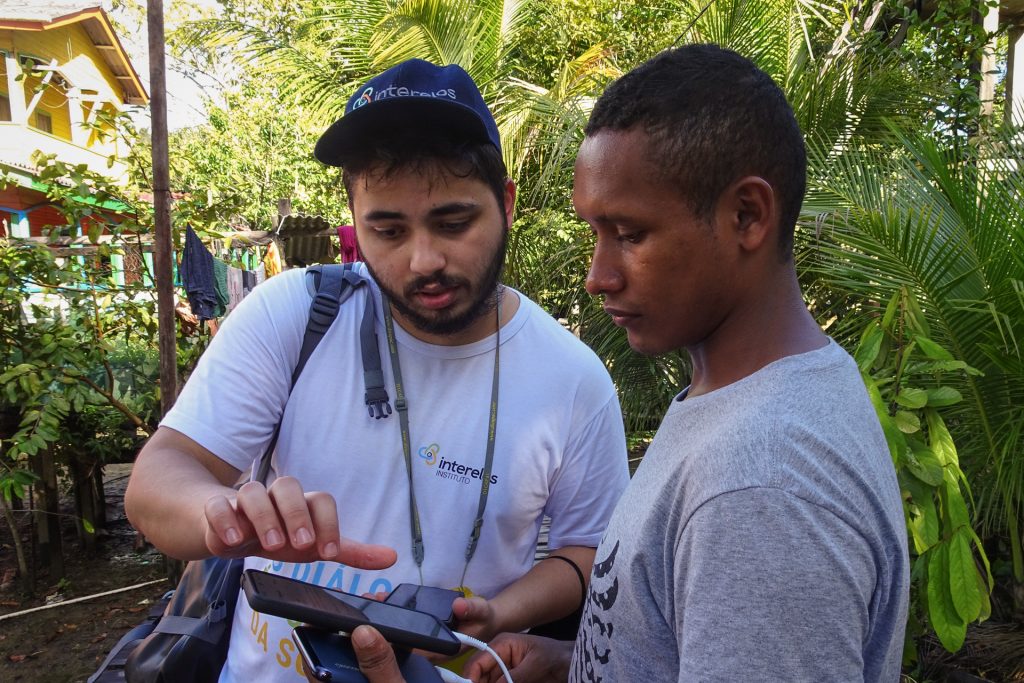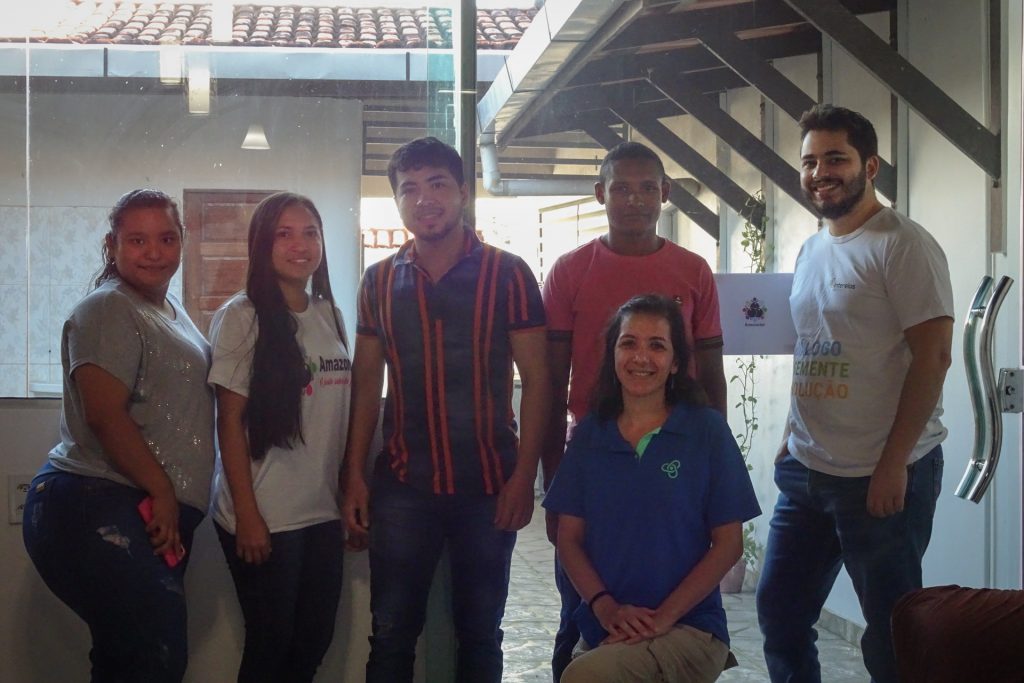Concrete data on the reality of producers help to map risks and demands in the region, measure community advances and challenges, in addition to developing local protagonists
The team of Interelos Institute started, in 2022, a data collection work on the socioeconomic and environmental reality of the members of the amazonbai, Cooperative of Agroextractivist Producers of Bailique and Beira Amazonas, in Amapá.
Being in the territories and collecting social, economic and environmental data is a fundamental action for the development of communities. Monitoring reality based on socioeconomic indicators is an important tool for measuring advances and challenges, guiding public policy makers and fundraising strategies.
The objective of the initiative, which lasted over 9 months, was to get to know the reality and opinion of the cooperative members in greater depth, to build a baseline to measure the cooperative's progress, in addition to allowing better-informed decision-making in the face of its biggest challenges. The initiative also sought to map the main risks and social demands among family producers and enable the identification of individuals with the potential to contribute to the development of the cooperative.
A common challenge in projects of this nature is to contribute to the accumulation of knowledge at the local level, changing the logic of communities as an object of study to make them protagonists in the construction and updating of its database.
Considering this premise of building autonomy in the territories where Interelos operates, the initiative relied on a team of local young people. The participatory construction among the consultants of the Interelos Institute, Mayte Rizek and Murilo Castro, and the young people from Bailique and Beira Amazonas ensured the logistical, technical and methodological planning suited to the local reality, in addition to strengthening community leadership, which should favor the future updating of the collected data. According to the report of one of the young people involved in the initiative:
“I've always enjoyed listening to other people's wishes, so I hope that this information collected can somehow lead to public policies for these people who are underserved. May we work looking at our young people and women protagonists within our territories, providing more job opportunities.”
The initiative started from articulation meetings with other partners operating in the territory, such as UEAP and Terroá. Then, the team defined the data and metadata to be collected, which later gave rise to the collective construction of the questionnaire, which also included suggestions from the cooperative's board. In October, the consultants were in Macapá to present the initiative at the Extraordinary General Assembly and coordinate the beginning of the series of home visits in the Bailique and Beira Amazonas regions.
During the period of data collection in each territory, cards that were disclosed in the groups of producers on WhatsApp. The collection was carried out personally by local young people via cell phone and application and included the georeferencing of the members' residences.
The questionnaire raised aspects related to family composition, associativism , environmental aspects, risks and social demands and economic activities with a greater focus on açaí, but also included other productive activities and sources of income. The collected data were organized and presented on the last 20th in an assembly with the cooperative members in the Arraiol community, where Rizek recalled that:
“The generated database is from the amazonbai and no about to Amazonbai.”

In all, 74 of the 128 members of Amazonbai were interviewed, 48 from Bailique and 26 from Beira Amazonas.
One of the results obtained allowed measuring the predominance of men and young people in the family workforce dedicated to the production of açaí, as well as revealing the risks and challenges that affect its production, in addition to the low access to the institutional market and public policies. In addition to açaí, based on the prepared seasonal calendar, it is possible to observe how cooperative members occupy their productive time with various activities, as well as the influence of environmental changes in recent years.
Respondents reported more advantages than disadvantages in being cooperative. Regarding the main advantages of being a cooperative member, the vast majority mentioned the acquisition of knowledge, soon after, the improvement in negotiation, in addition to the increase in quality of life and income, followed by the promotion of a sense of collectivism. One of the producers interviewed considers that:
“The great advantage of being a cooperative member is being able to be part of a sustainable and real project, in which the producer owns the production chain process.”

From the point of view of projection and planning, the vast majority of members (97%) see themselves remaining in the amazonbai in the next 5 years. Regarding the goals established in the cooperative's strategic planning, almost all of the interviewees believe that they will be achieved, denoting a climate of trust among those involved in the community enterprise. In the perception of one of the young people involved in the initiative:
“Amazonbai is a life project for each cooperative member, because each member believes that they will improve their lives through the cooperative, selling their açaí, which is the main source of income in the Bailique and Beira Amazonas regions.”

The initiative was coordinated by Aerton Paiva, with the collaboration of Mariana Chaubet . In the territories, the team was reinforced by Andrey Figueiredo and Lenilza Farias, from Bailique, and Gabrielle Santos Corrêa and Álvaro dos Reis Maciel, from Beira Amazonas. The initiative also relied on the essential collaboration of Amiraldo Picanço, president of the cooperative, and Jaqueline Sanches, project assistant at Amazonbai.
